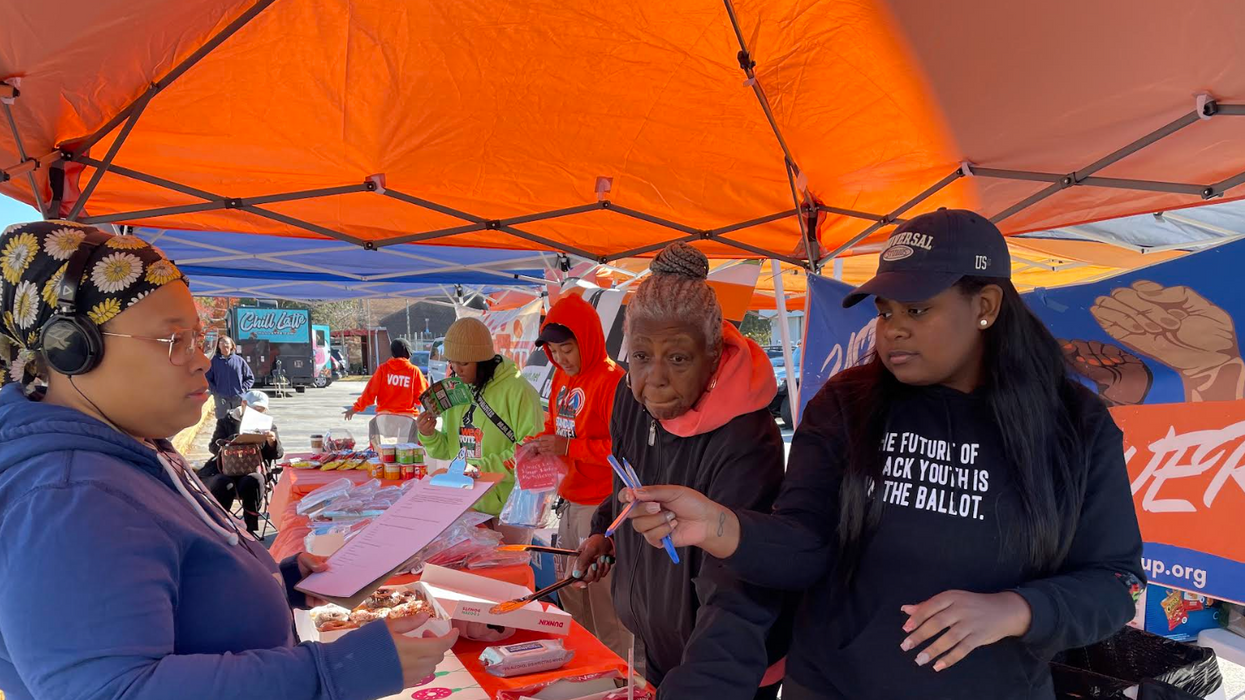In Senate Runoff, Georgia's Organizers Defy GOP Attack On Voting Rights
On the only day of Sunday voting before Georgia’s U.S. Senate runoff, the auto-parts store parking lot across the street from Atlanta’s Metropolitan Library looked and sounded more like a block party than a get-out-the-vote event.
“We’re having a good time on this corner. If you feel the spirit, let me hear your horn. Come on!” bellowed D.J. Concrete Kash above a sound system that played gospel music and was next to several orange shade tents filled with free food, water, hand warmers and voter guides.
“We have five or six organizations out here coming together to say, ‘Hey, we believe in what you all are doing,” said Chandra Gallashaw, a community organizer. “Georgia Stand Up is over there. The NAACP. Black Voters Matter. We Vote, We Win… It has nothing to do with anyone running for office. It has to do with these people over there in line exercising their right, their constitutional right to vote.”
The tables at this pro-voter effort comprised some of Georgia’s oldest and newest non-profit civil rights groups. While they were careful not to endorse any candidate, their presence was a powerful rejoinder to the state’s GOP-led government, whose 2021 legislation banned giving food and water to anyone waiting to vote, among other roll backs of voting options.
“As we know, our governor [Republican Brian Kemp] banned us from being able to give water in line. We have to be 150 feet away from the polls,” said Mykah Owens, a campaign associate with We Vote We Win. “One of our guys measured and made sure that we’re far enough from the polls so we won’t get in trouble.”
“We had to do something,” said Gallashaw. “The fact we cannot give water in line to people who stand in line for two or three hours… Some of these folks are 70, 80 years old. Some of them are diabetic. They have health issues.”
A similar “Party to the Polls” was held at three of Fulton County’s two-dozen voting sites on Sunday and will continue through the early voting period which ends on Friday. While the event was a rarity in this populous county, its significance was not lost on Black voters.
“I love the fact that although they tried to pass a law where you couldn’t give water and things to people in line, they just put it across the street,” said Yasha Yisrael, who, with her husband, Chasum Yisrael, were sipping free smoothies from one of three food trucks. “It’s amazing.”
“It’s something that should have been done all along and I hope they continue it,” she continued, “because it does encourage more people who would not normally vote who are registered to come in and vote because they feel this sense of community.”
“Every effort is being tried to stop our right to vote,” said Chasum Yisreal. “We’ve got to be smart about it.”
The couple said that they did not know who the newer civic groups were. But across the state’s 159 counties, a coalition of community-based organizations, from mainstays like the NAACP and sororities and fraternities from historically Black colleges and universities to new groups targeting younger people, are making a determined effort to turn out voters for the Senate runoff and to keep in touch year round to try to change state’s political representation.
Georgia, as Rep. Nikema Williams told the Democratic National Committee last June in a bid to urge the DNC to move up its 2024 presidential primary date, is one of the nation’s most racially diverse states with growing Black, Latino and Asian-Pacific Islander populations. It is the fifth-ranked state for women-owned businesses and 41 percent of all businesses are minority owned, which is double the national average. But cosmopolitan Atlanta is surrounded by the old South, where conservatives continue to dominate county and municipal government.
That landscape has turned every recent Georgia election into a struggle to engage voters. The Senate runoff was no exception and is operating under some new voting rules.
This is the first time that a statewide runoff is being held one month after Election Day. That timetable is half as long as the state’s two U.S. Senate runoff elections in 2020 and was created by the GOP’s 2021 legislation. One impact of the shorter timetable is to block new voters from registering. It also is too tight a timeline to obtain and return a mailed-out ballot.
Additionally, the legislation shortened the runoff’s early voting period to one week, although some metro counties expanded it through this past weekend, and a few counties started before Thanksgiving. (Republicans tried to bar voting on Saturday but lost in court last week.)
The early turnout numbers suggest that voters are not deterred by the 2021 law’s tightening of voting options. On Sunday, Gabriel Sterling, the chief operating officer for Georgia Secretary of State Brad Raffensperger, a Republican, tweeted that some metro Atlanta voting sites were experiencing waits of two hours. The wait at the Metropolitan Library’s first day of early voting on Saturday was as long, said We Vote, We Win’s Owens.
“We had over a two-hour wait yesterday. You usually don’t see that until the end of early voting – more towards the Election Day,” she said. “People are paying attention.”
Steven Rosenfeld is the editor and chief correspondent of Voting Booth, a project of the Independent Media Institute. He has reported for National Public Radio, Marketplace, and Christian Science Monitor Radio, as well as a wide range of progressive publications including Salon, AlterNet, The American Prospect, and many others.
This article was produced by Voting Booth, a project of the Independent Media Institute.












